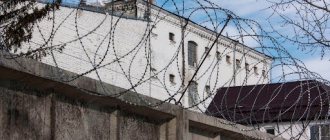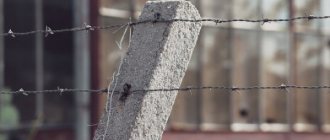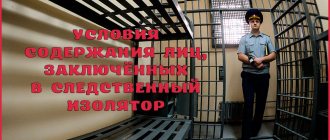The Russian Federation has created a full-fledged punishment execution system, which includes several types of correctional institutions. The multi-stage nature of the system implies the possibility of transferring prisoners to different modes of serving their sentences depending on their behavior and compliance with the rules of serving their sentences.
The severity of the committed act directly determines the term of punishment and the correctional institution, each of which has a specific regime. It depends on the place where the sentence is served whether the convicted person will feel the hardships of a strict regime or will be in more lenient conditions.
Strict regime as punishment
The Criminal Code of the Russian Federation provides for a strict regime for serving punishment for persons who have committed crimes of the following type:
- Intentional criminal acts.
- Recidivism of crimes.
- Murders of two or more people, serial murders.
- "Contract" killings of people.
Persons who have received a strict regime of imprisonment are almost completely isolated from society for a period of time established by law, and their freedoms and rights are maximally limited.
A particularly strict regime of detention is provided for persons found guilty of particularly serious acts and sentenced to serve a life sentence or the death penalty. Criminals sentenced to capital punishment are kept in maximum security colonies, but under more severe conditions. Prisoners who have violated the rules of serving their sentences in maximum security colonies are transferred to special conditions of detention.
Concept of routine
The internal regulations are common to the entire penitentiary institution, are established by management taking into account federal regulations and are signed by the head of the pre-trial detention center or prison/colony.
The regime in a pre-trial detention center is the procedure and conditions of detention for those convicted in a penitentiary institution, which is a generally accepted standard and must be strictly observed by all involved. For violation of the regime, sanctions may be applied - placement in a punishment cell, solitary confinement, a ban on long or short-term visits, and so on. The preventive measure will depend on the management of the institution itself.
Difference between modes of serving sentences
The principle of organization is the same in all colonies. The entire area of the facility is divided into several zones:
- Working.
- Residential.
- Leisure and cultural events.
The conditions for serving a sentence in strict and general regime colonies differ in the following characteristics:
- Contingent of prisoners. People are sent to general regime correctional institutions to serve sentences for committing serious and moderate crimes for the first time. The maximum security colony is intended for repeat offenders and persons who have committed particularly serious crimes.
- Spending money. A general regime colony allows maximum spending on food and other funds in an amount that does not exceed three times the minimum wage. For high security facilities, such expenses are limited to two minimum wages.
- Permitted visits with relatives. The general regime allows a maximum number of short-term meetings 6, long-term 4. For the strict regime, the number of meetings is limited to three.
- Possibility of transfers to convicts. Persons serving a sentence in a general regime colony are allowed to send 6 parcels and 6 parcels. For strict regime, the number of transfers is limited to 4, for parcels and parcels. In 2022, the restrictions on the maximum weight of a parcel sent to the colony have been changed; it has been increased from 20 to 50 kilograms.
How is the “rise” command given?
In a correctional colony, guards, guards, or employees occupying certain positions are on duty 24 hours a day. The duty of one of them is to press the bell button at the set time. The sound spreads throughout the entire building of the correctional colony. Hearing him, the prisoners wake up and clean their beds.
Not all prisons have a bell. If there is no special signal, then the guards, warders or prisoners on duty wake up the prisoners, they walk through each cell and loudly voice the command “rise”.
In some soft-security colonies, where prisoners who have committed a minor crime are imprisoned, a personal alarm clock is allowed in the cell. But, firstly, such a privilege must first be earned. It is allowed only to those prisoners who strictly observe discipline and have never violated order. Secondly, the type of alarm clock and melody is selected only with the permission of the prison administration. In high-security penal colonies, such a privilege is not available, even with exemplary behavior.
Confinement of women in correctional institutions
More lenient conditions of detention are provided for female criminals than for males. This is expressed in the absence of strict and special regime women’s colonies on the territory of the Russian Federation.
If a crime of any gravity is committed, the woman will be sent to serve her sentence in a penal colony or general regime. There are no other concessions for female criminals. All other rules for serving women and men are the same. If a woman has been assigned a strict confinement regime, she has the following restrictions:
- Contained in a closed room in which there are several people.
- The time for outdoor walks is limited and should not exceed an hour and a half daily.
- Meetings with relatives twice a year.
- Receiving parcels three times a year.
All prisoners are assigned to dormitories or cells. Women who have committed an unlawful act serve their sentences separately from repeat offenders. Criminals who have committed an illegal act of a particularly serious nature serve their sentences in separate cells.
What it is
Members of the criminal subculture call kicho a prison isolation cell or punishment cell. Criminals are sent there for any offenses or refusal to obey the prison administration. Another reason for imposing punishment is violation of the colony regime. While in the punishment cell, convicts are deprived of basic amenities, and full control over their lives is ensured.
Features include:
- a punishment cell is a very small room, the area of which is no more than 6 square meters. m.;
- here the convicts are alone, and the punishment cell is not heated;
- for a long period of time, the bunks are attached to the walls, so the criminal cannot lie down or sit comfortably;
- there are usually rats running around on the quiche, and poor food is provided;
- prisoners in the isolation ward cannot go for walks, and there is no toilet or other amenities;
- sometimes there is a small gap that replaces a full window;
- due to the damp and cold walls against which convicts lean, tuberculosis and other serious diseases often occur;
- the cells are not ventilated, and due to unsanitary conditions, prisoners suffer from rotavirus and other diseases caused by E. coli;
- a person placed in isolation faces severe legal restrictions, so he is prohibited from smoking, receiving packages from relatives, calling family or buying products.
Attention! Several years ago, even stricter detention measures were used, since prisoners could not use a mattress or linen, and food was given every other day.
Nowadays, bunks intended for sleeping are attached to the walls from 5 am to 11 pm. Therefore, convicts are forced to stand or sit on the bare ground all the time during the day. Offending prisoners are placed in a punishment cell for a period not exceeding 15 days, but prison administrations often violate this requirement, so people have to live in inhumane conditions much longer.
Free legal consultation
+8 800 100-61-94
It is also useful to read: What is a punishment cell
Schedule
Each correctional institution has an established daily routine for convicts serving their sentences. The rules established by the procedure are strictly regulated and mandatory for all prisoners. When developing a prisoner's daily routine, various factors are taken into account:
- Specifics of work.
- Terrain conditions.
- Season.
- Other circumstances.
A standard daily routine includes the following:
- Climb.
- Lights out.
- Hygiene procedures.
- Physical exercise.
- Eating.
- Labor activity.
- Training sessions.
- Educational activities.
- Leisure.
The daily routine provides acceptable time intervals for each item. Continuous sleep for 8 hours. Eating no more than half an hour. Personal time and leisure up to one hour.
Photos of general regime colonies
Photos were kindly borrowed from the official pages of these institutions: PKU IK-1 OF THE FSIN OF RUSSIA FOR THE TVER REGION, Federal State Institution “Correctional Colony No. 1 of the Federal Penitentiary Service of Russia in the KBR” (FKU IK-1).
Conditions of serving the sentence
In accordance with Article 121 of the Penal Code of the Russian Federation, prisoners are subject to various conditions of detention: ordinary, light and strict. Initially, all convicts are placed in normal conditions .
Subsequently, they can be transferred to light or strict conditions of detention for convicted prisoners by decision of the commission.
Comparison of living conditions in a general regime colony:
| Conditions | Accommodation | Amount of funds allowed for spending, rubles | Permitted number of visits, short-term and long-term, per year | Permitted number of parcels or transfers per year | Permitted number of parcels, per year | Daily walks, h |
| Regular | Dormitory | 9000 | 6+4 | 6 | 6 | — |
| Lightweight | Dormitory | No limits | 6+6 | 12 | 12 | — |
| Strict | Lockable room | 7800 | 3+3 | 3 | 3 | 1,5 |
Convicts can get into lighter conditions for a conscientious attitude to work and exemplary behavior during six months of their sentence under normal conditions.
But if criminals staying in light conditions violate the established order, they will be transferred to ordinary or strict conditions. Those convicted for malicious violation of the order of serving a sentence may go from ordinary to strict conditions . Convicts are transferred from strict conditions to ordinary conditions only after six months in the absence of penalties.
Daily walks in the regular and lightweight ones are thinning out, since the peredvizhniki there are more free than in the strict ones. In a strict condition, the prisoner sees nothing at all except his cell and work (well, the walk is 1.5 hours).
Conditions of detention
The general regime colony is divided into several zones:
- living room - it contains cells, a toilet, a shower or bathhouse, and a dining room;
- production - here convicts work;
- for relaxation and walks - libraries, theater, etc.;
- administrative;
- punishment cell.
The cells can be of different sizes, but usually they can accommodate 40 people. Existing space standards for prisoners are different: for men the minimum size is two square meters, for women - three and a half. Bunk beds are installed in two rows.
The bathroom and kitchen are located separately from the main chamber. In women's colonies, duty is mandatory. Cleaning is carried out daily morning and evening . Prisoners are provided with clothing: underwear, shirts, outerwear, shoes. On average, the wear life of clothes and shoes is three years, and that of underwear is one year. In winter, they are provided with warm clothes and shoes designed to last for three years.
Schedule
The management of each correctional institution independently establishes the daily routine of prisoners in accordance with the Internal Rules, but it should not go beyond the law. The working conditions of the correctional institution, geographical location, time of year and other conditions are taken into account.
The approved daily routine is signed by the head of the colony and brought to the attention of staff and prisoners. Prisoners must be provided with eight hours of uninterrupted sleep. The daily routine includes time for: getting up and going out, exercising, going to the toilet and making beds, eating, working with a lunch break, morning and evening checks, as well as personal time, all this is reflected in Order of the Ministry of Justice of Russia dated March 27, 2019 N 51. Here approximate daily routine :
- rise no later than 5:00 - 6:00;
- exercises, hygiene procedures, filling beds - up to 45 minutes;
- 30 minutes are allotted for breakfast;
- morning check, inspection of appearance - up to 30 minutes;
- the first part of the work shift;
- lunch, which should take 40 minutes;
- second part of the work shift;
- dinner takes place within 30 minutes;
- personal time is 1 hour 30 minutes;
- evening check, getting supplies for sleeping, toilet - everything should take up to 30 minutes;
- lights out.
Separate schedules are also provided for educational activities and receptions on personal matters. On weekends, the daily routine changes - cultural and sports events, school and college education are added to it.
Nutrition
In general regime correctional institutions, prisoners are provided with three hot meals a day - breakfast, lunch and dinner. The menu is monotonous and meager .
- For breakfast, usually porridge (barley or oatmeal, once a week - millet), cooked in water, often undercooked.
- For lunch - first thing: cabbage soup made from combined fat (it is difficult for the body to digest); second: porridge with something resembling pieces of meat; drink: weak tea solution.
- For dinner - wormy fish with the same poorly cooked porridge. The bread is also of rather low quality, made from very poor flour.
The main food for prisoners is pasta and cereals. They diversify with vegetables such as cabbage, onions, potatoes and beets. Meat is included in the diet. It is of very low quality. Sometimes meat is replaced with low-grade sausages and canned food. Fresh fruit is rare in the colony. Sometimes they bring apples, but more often dried fruits.
Meager food standards in the zone are not observed. But prisoners can choose better food by buying food in a store if they have enough money in their personal account.
More information about the nutrition of prisoners in Russian prisons can be found here.
Job
According to Article 103 of the Penal Code of the Russian Federation, every prisoner is obliged to carry out labor duties . The administration of the correctional institution selects a feasible job for the person serving his sentence, taking into account the gender, age, physical condition of the prisoner, and his specialty. If a prisoner refuses to work, then the administration of the colony records a malicious violation of order, and the violator is sent to a punishment cell (we talked about the peculiarities of the stay of prisoners in a punishment cell and other places for punishment in the MLS in a separate article). As a result, the prisoner loses the right to parole.
In some colonies, work is a privilege due to the lack of vacancies. In this case, the management of the correctional institution selects the most qualified convicts for work, but tries to attract as many prisoners as possible to work - they bring profit to the colony, and it is easier to monitor busy prisoners.
Convicts interested in work receive work experience, which increases their chances of early release. For conscientious work, working prisoners have the opportunity to receive incentives and concessions in the regime .
In some cases, for work, convicts can receive monetary remuneration into their personal account, send it to relatives if necessary, compensate for material damage caused to them, and pay alimony. But more often than not, this income is barely enough to buy food.
Often, prisoners are employed under Article 106 of the Penal Code of the Russian Federation for a full work shift, and according to the law, only two hours a week are allowed to work for free, for certain citizens and in their free time. But there is a reservation that, at the written request of the convicted person, he can work more than the allotted time. Unscrupulous colonial leaders take advantage of this clause and recruit unsuspecting people into free labor.
Prisoners work in a variety of fields - they sew clothes and shoes for themselves, the Federal Penitentiary Service, the Ministry of Internal Affairs and the Ministry of Defense, they pack food, and make furniture.
Studies
Often, educated people end up in colonies, some with one or two higher educations. But if the convicted person does not have any education and he wants to get a certificate, a working profession or graduate from a university, then he can receive basic (complete), primary vocational or higher education within the walls of a correctional institution. This right is enshrined in Articles 108 and 112 of the Penal Code of the Russian Federation.
Prisoners who have completed their education have the opportunity to find a job after returning from prison, but not every employer will agree to hire a former prisoner.
Entertainment and relaxation
In their free time from work, as well as on weekends, convicts can walk in a specially designated area , communicate, watch TV, and visit the library. They organize theatrical performances for themselves, FSIN employees and invited guests, go in for sports, play chess, backgammon, and cards.
Or they write letters to relatives, friends, or get to know each other by correspondence. An increasing number of convicts visit churches located on the territory of correctional institutions.
Citizens who have broken the law acutely feel the need for repentance and spiritual rebirth . While behind bars, they analyze their actions, they have a need to share their thoughts with the priest, repent and free themselves from guilt. At such moments, clergy come to their aid, providing moral support to the condemned, helping them to comprehend their sin and take the path of correction.
Often, spiritual and moral correction helps a believing criminal, after release, not to take the slippery slope again.
Dates and visits
The number of meetings with relatives depends on the conditions in which the convicted person is kept.
According to Article 121 of the Penal Code of the Russian Federation, convicts in general regime colonies under normal conditions have the right to six short-term and four long-term visits per year . Also, according to Article 89, Part 2.1, those serving a sentence in a general regime have the opportunity to have up to two long monthly visits with a minor child under 14 years of age on weekends and holidays with accommodation outside the correctional institution, but in the locality in which the place of serving the sentence is located.
Those serving a sentence in a general regime colony under light conditions are entitled to six short-term and six long-term visits per year. They also have the right to long-term visits with children under the same conditions as those serving sentences under general conditions. For successful adaptation, those serving sentences in light conditions, 6 months before the end of the sentence, are allowed to live with their family and work outside the correctional institution under the supervision of the administration of this institution.
Convicts serving sentences under strict conditions are entitled to three short and three long visits per year.
You can read about how short-term meetings are conducted in this material, and you will learn about the features of long-term meetings with prisoners here.
Transfer of products and things
The number of parcels or deliveries depends on the conditions in which the convicted person is kept.
- Under normal conditions, those serving sentences are entitled to receive six parcels or parcels and six parcels per year.
- Those serving sentences in light conditions are entitled to twelve parcels or packages and twelve parcels per year.
- Those serving sentences under strict conditions are entitled to receive three parcels or parcels and three parcels per year.
Read about how to properly collect and deliver a parcel to a prisoner in a separate article.
What are the distinctive features of correctional institutions for women from the above?
Women can be together regardless of the severity of the crime. In women's colonies, duty is organized in accordance with the schedule drawn up by the elder. She also ensures that order is maintained. The women's colony is cleaned twice a day.
Visiting the shower or bath is possible without restrictions, but washing is carried out on certain days, each woman has her own day. You can use cosmetics. Women are not sentenced to life imprisonment; the maximum term of imprisonment is limited to 35 years .
We talk about the conditions of stay in women's correctional colonies in more detail in a separate material.
What offenses can you get there for?
Convicted men end up in this correctional institution if they have committed a serious crime for the first time (that is, they have not previously served imprisonment). Also included here are malicious violators of the established order from settlement colonies and convicts from colonies for juvenile offenders when they reach adulthood.
Women end up in a place of serving a general regime sentence for serious and especially serious crimes committed for the first time, as well as any repeat offenders.







